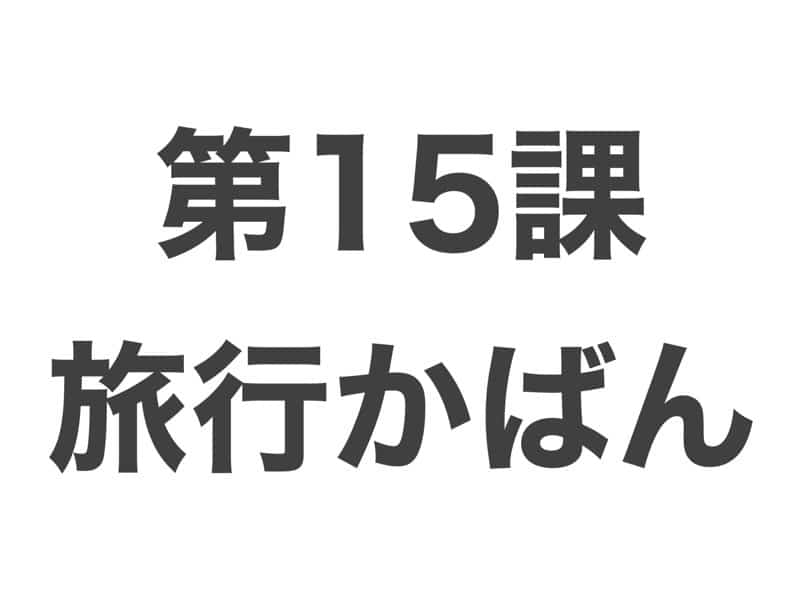新しい言葉
| 問いかけ | Question, inquiry |
| 一言 | A word, brief comment |
| 変える | To change, to alter |
| 講演する | To give a lecture, to present |
| 講演者 | Speaker, lecturer |
| 耳を傾ける | To listen carefully, to lend an ear |
| ベストセラー | Bestseller |
| ふれ合い | Interaction, close contact |
| 旅する | To travel |
| 著者 | Author, writer |
| 依頼する | To request, to commission |
| 若者 | Young person, youth |
| 何気ない | Casual, nonchalant |
| 思わず | Unintentionally, reflexively |
| 知らぬ間に | Before one knows it, without realizing |
| いい気になる | To get conceited, to feel smug |
| 出会い | Encounter, meeting |
| 気が合う | To get along well |
| 〜をはじめ | Starting with, including |
| 歩き回る | To walk around, to wander |
| 体験する | To experience |
| 重ねる | To accumulate, to repeat |
| さすがに | As expected, just as one would expect |
| 感心する | To be impressed, to admire |
| 表情 | Expression, facial expression |
| 調子に乗る | To get carried away, to get cocky |
| 独特な | Unique, distinctive |
| 自慢する | To boast, to show off |
| 自慢げな | Proud, boastful |
| そういえば | Now that you mention it, come to think of it |
| 話を合わせる | To go along with someone’s story, to agree with |
| 黙り込む | To fall silent, to shut up |
| 清潔な | Clean, tidy |
| 〜わけがない | There’s no way that ~ |
| 〜だけに | Because ~, as expected of ~ |
| ショックな | Shocking, surprising |
| 気がつく | To notice, to realize |
| おかしい | Strange, funny |
| 恥ずかしい | Embarrassing, ashamed |
| ものが見える | To see something |
| 冒頭 | Beginning, opening |
| 詰める | To stuff, to pack |
| まとめる | To summarize, to organize |
| テーマ | Theme, topic |
| 願う | To hope, to wish |
| 添える | To add, to attach |
| 和む | To feel relaxed, to be at ease |
| 拍手する | To applaud |
| 締めくくる | To conclude, to bring to a close |
いっしょに考えましょう
- Do you like traveling?
- What factors do you consider when deciding on your travel destination?
- Are there any people or places from your past travels that left a strong impression on you?
読みましょう
The conversation began with the surprising question, ‘Have you ever been told, “You smell too”?’. The speaker continued, “That one comment changed me,” capturing the audience’s attention. This occurred during a lecture given by the author of the bestseller Sekai Fureai no tabi. A casual remark from a young person changed the speaker, who realized he had become overly pleased with the success of their book without even realizing it. Then the speaker began to talk about their experiences in India.
The speaker got along with a young person who had studied in Japan and decided to have a meal together. When the speaker said, “I have traveled around Asia and the world, meeting people and having experiences,” the young person asked, “Please tell me about various places.” The young person listened with an impressed expression, saying, “Wow. You really are someone who’s traveled the world.” The speaker then, got carried away and started talking about smells. “Every place has its unique smell, and even with my eyes closed, I can tell where I am.” When the speaker said this proudly, the young person replied, “Speaking of which, Japan is like that too.” With that one comment, the speaker fell silent.
The speaker was shocked by the young person’s comment, as he had assumed that there wouldn’t be any smells in clean Japan. However, upon reflection, the young person’s point that there might be a “Japanese smell” that Japanese people don’t notice made sense. The speaker felt unable to respond because he was embarrassed that he had never considered how their living environment appeared to others. He thought, “Is it possible to connect without knowing yourself? If I don’t start by understanding my own smell, I won’t be able to understand or see others.” This is how the young person’s comment resonated with the speaker.
In closing, the opening words were repeated: ‘Being told, “You smell too” changed me.’ The speaker concluded by saying, ”Now, with the awareness that I, too, have a smell, I continue my journey, packing it into my travel bag.” The speaker added, “I hope to write my next bestseller on this theme,” bringing warmth to the audience and concluding the talk with a round of applause.
答えましょう
- What kind of person is the speaker?
- What words changed the speaker’s perspective?
- In India, who did the speaker meet, and what conversation did they have?
- How did the person from India respond to the speaker’s story?
- What did the speaker feel embarrassed about?
- How did the young person’s remark resonate with the speaker?
- What thoughts does the speaker have as they continue their trip?
- How did the speaker conclude the lecture?
使いましょう
まとめましょう
- What did the speaker talk about to the youth in India?
- What did the youth say at that time?
- From that one comment, what did the speaker realize?
話しましょう
- What has been the most enjoyable trip you’ve taken so far? Who did you go with, and what did you do there?
- What place would you like to introduce to a foreigner in the area where you were born? What is that place like, and what can one do there?




コメント